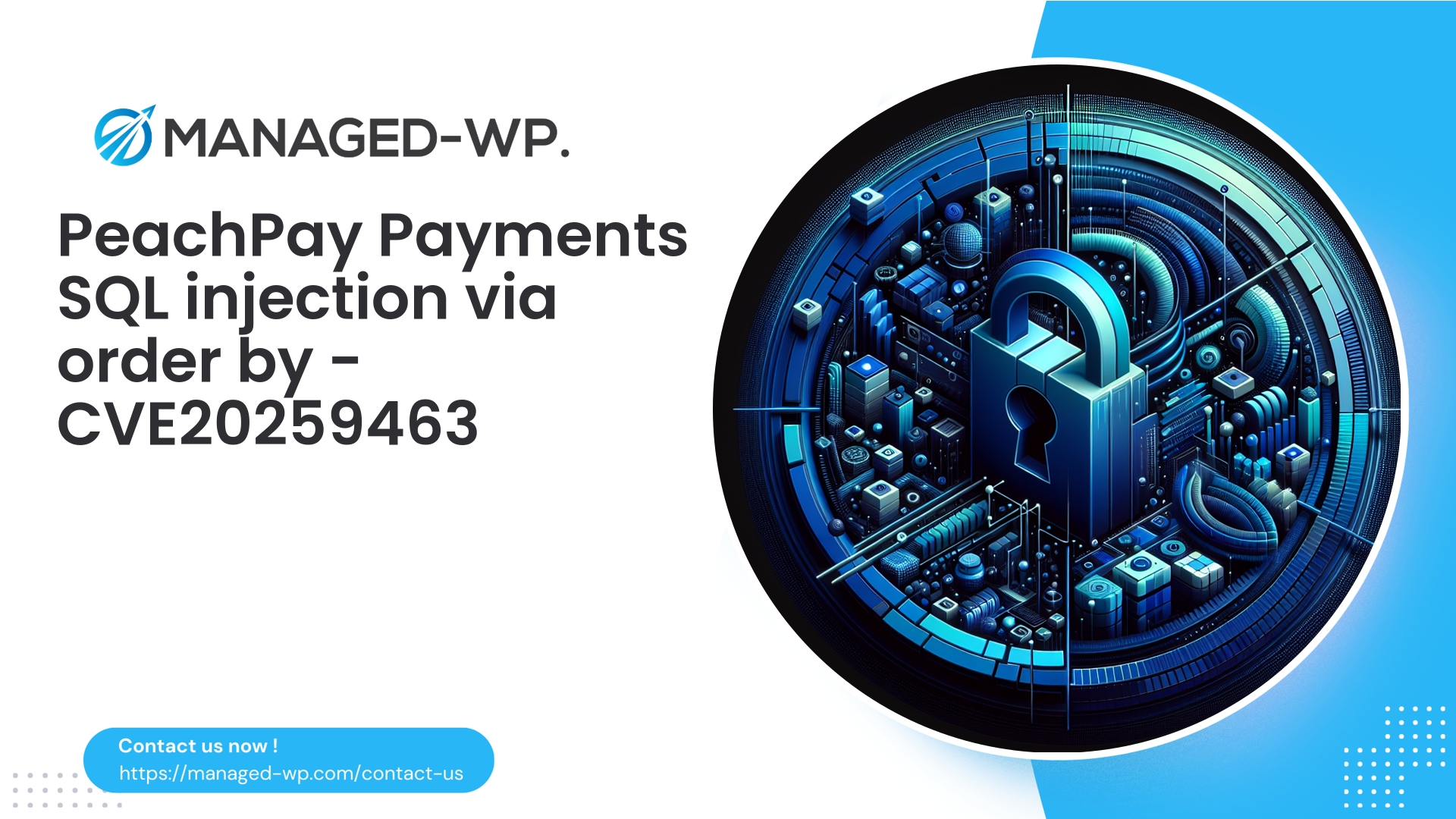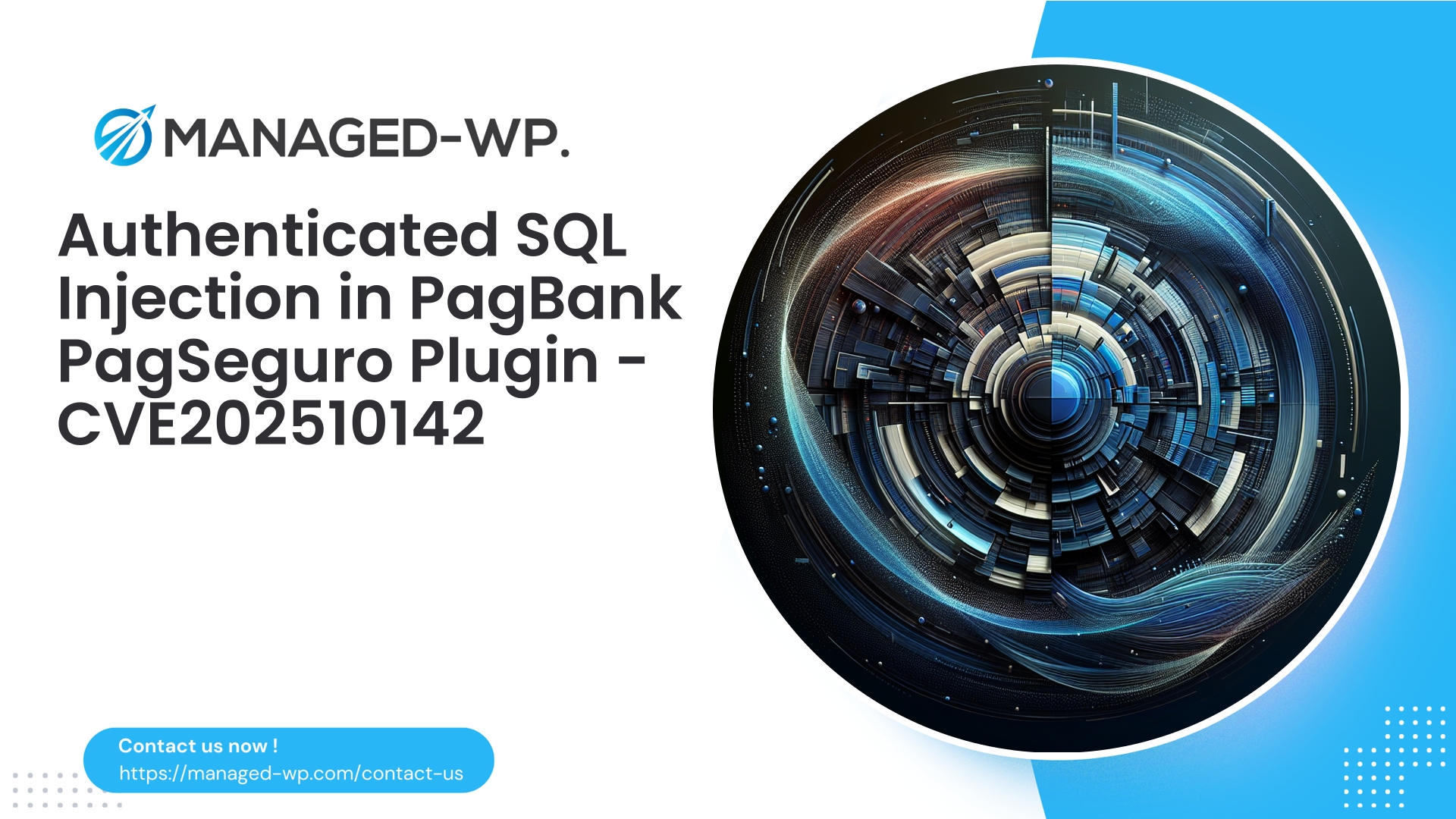| 插件名稱 | PeachPay支付 |
|---|---|
| 漏洞類型 | 已認證的 SQL 注入 |
| CVE編號 | CVE-2025-9463 |
| 緊急 | 高的 |
| CVE 發布日期 | 2025-09-09 |
| 來源網址 | CVE-2025-9463 |
PeachPay支付外掛程式中存在嚴重的已認證SQL注入漏洞-WordPress網站所有者應立即採取的措施
執行摘要
WordPress 的 PeachPay Payments 外掛程式中發現了一個危險的 SQL 注入漏洞 (CVE-2025-9463),影響版本 1.117.5 及更早版本。此漏洞允許具有「貢獻者」或更高權限的已認證使用者利用不安全的 SQL 注入操作。 按 參數。由於經過驗證的 SQL 注入的特性,攻擊者可以操縱資料庫查詢以提取敏感資料或提升權限。供應商已在 1.117.6 版本中修復了此問題,但未打補丁的網站仍面臨嚴重風險。
這項分析由 Managed-WP 提供,該公司是美國值得信賴的 WordPress 威脅防禦安全專家。我們的目標是幫助網站管理員、開發人員和安全團隊掌握必要的知識,以便評估風險、識別攻擊模式並實施有效的緩解和恢復策略。我們也為 WAF 維運人員、外掛程式開發人員和主機服務供應商提供建議,以便在修補程式部署期間快速降低風險敞口。
了解漏洞
- PeachPay Payments 外掛程式(≤ 版本 1.117.5)存在經過驗證的 SQL 注入漏洞。
- 該漏洞源於對以下內容的驗證不足:
按用於動態 SQL 查詢排序的參數。 - 攻擊者只需要貢獻者層級的存取權限(或在特定配置中有時需要訂閱者層級的存取權限)即可建構惡意輸入。
- 該漏洞允許攻擊者改變 SQL 查詢行為以竊取資料、引發伺服器錯誤以洩露內部細節,或影響資料庫操作超出預期範圍。
- 該問題已在 1.117.6 版本中修復;安全社區已分配 CVE-2025-9463 進行追蹤。
為什麼至關重要: 在社群或電商 WordPress 網站上,貢獻者或訂閱者角色十分常見,這使得可利用的帳戶廣泛存在。由於需要身份驗證,現有的保護未經身份驗證的端點或限制管理員存取權限的緩解措施無法應對這種情況,從而增加了攻擊者可乘之機。
漏洞利用概述(負責任揭露摘要)
我們不打算公開具體的攻擊負荷,但以下概述可供參考,以協助採取防禦措施:
- 存在漏洞的插件端點接受一個
按參數,通常透過 AJAX 或 REST 請求。 - 此參數直接插入到 SQL ORDER BY 子句中,沒有嚴格的白名單強制執行。
- 攻擊者可以新增 SQL 令牌、子查詢或函數來操縱資料庫結果或強制發生錯誤情況,從而洩漏資料。
- 由於該漏洞利用需要經過身份驗證的使用者上下文(貢獻者角色),因此簡單的管理頁面限制無法阻止它。
WordPress網站經營者應立即採取的步驟
如果您的網站使用 PeachPay Payments,請立即採取行動:
- 請檢查您的外掛程式版本
- 登入 WordPress 管理後台,然後導覽至「外掛程式」→「已安裝外掛」以查看您的 PeachPay Payments 版本。
- 如果您的版本是 1.117.5 或更早版本,則表示您的安裝有安全隱患。
- 立即更新至 1.117.6 或更高版本
- 立即應用廠商提供的補丁。及時更新是最好的防禦措施。
- 如果管理多個站點,請協調立即推出更新。
- 如果無法更新,則部署補償控制措施。
- 啟用 Web 應用程式防火牆 (WAF) 規則,阻止惡意有效載荷
按參數。 - 過濾或封鎖可疑字元和 SQL 結構(例如,引號、分號、註解標記、SQL 關鍵字)。
- 僅將已知有效的列名列入白名單,用於排序參數。
- 利用具備虛擬修補功能的主機或插件防火牆。
- 啟用 Web 應用程式防火牆 (WAF) 規則,阻止惡意有效載荷
- 透過使用者管理限制風險敞口
- 審核並暫時停用不活躍或可疑的使用者帳號。
- 考慮降低權限或限制貢獻者存取權限,直到插件更新為止。
- 盡可能停用不必要的處理訂單邏輯的前端端點。
- 調查日誌和入侵指標
- 搜尋 Web 伺服器、WAF 和應用程式日誌以查找異常情況。
按包含可疑令牌的請求。 - 查看錯誤日誌、資料庫負載或意外內容變更是否有異常峰值。
- 搜尋 Web 伺服器、WAF 和應用程式日誌以查找異常情況。
- 如果懷疑帳戶已被盜用,請更改憑證。
- 輪換管理員和高級帳戶的密碼和 API 金鑰。
- 強制重置密碼並檢查存取令牌。
- 執行全站掃描和安全審計
- 檢查是否存在惡意軟體、後門、Webshell 和未經授權的修改。
- 審核已安裝插件和核心完整性。
- 如果系統遭到入侵,請遵循事件回應程序。
- 隔離受影響的站點,以防止進一步的資料遺失。
- 保留日誌和取證資料以供分析。
- 漏洞緩解後,從乾淨的備份中復原。
- 必要時尋求專業事故響應援助。
日誌記錄和檢測指標
保持警惕至關重要。注意以下跡象:
- 請求與
按或者按包含可疑字符,例如引號、分號或 SQL 關鍵字(例如 UNION、SELECT)。 - 來自相同認證使用者但多個 IP 位址的重複排序/過濾呼叫。
- 日誌中出現與前端活動相關的意外資料庫錯誤。
- 與清單端點相關的 CPU 使用率飆升或查詢速度緩慢。
- 存在異常內容變更或未經授權的使用者/角色修改的證據。
插件開發者指南:安全排序參數
為防止此類漏洞,開發人員應實施嚴格的輸入驗證策略。關鍵最佳實務:
- 實作排序輸入白名單機制
'post_date', 'title' => 'post_title', 'price' => 'meta_value_price', ); $requested = isset($_GET['order_by']) ? sanitize_text_field($_GET['_by']); array_key_exists($requested, $allowed) ) { $order_by = $allowed[$requested]; } else { $order_by = $allowed['date']; } $pre-Tac~.. {$wpdb->posts} ORDER BY $order_by DESC LIMIT %d", $limit); $rows = $wpdb->get_results($query); ?>
- 切勿將原始使用者輸入直接插入 SQL ORDER BY 子句中。
- 將使用者輸入對應到安全性、預先定義的資料庫列。
- 使用
$wpdb->prepare()但請記住,ORDER BY 元件不能參數化——因此白名單至關重要。
- 透過傳遞經過清理和驗證的參數(例如,使用已知安全的「orderby」值來呼叫 WP_Query),安全地使用 WordPress 查詢 API。
- 應用最小權限原則-將接受訂單的端點限制為僅允許所需的使用者角色。
- 使用 WordPress 函數嚴格地清理和轉義輸入,例如
sanitize_text_field()和esc_sql(). - 為便於取證,應記錄可疑或異常的訂購參數。
建議的WAF規則策略(適用於主機和安全團隊)
- 白名單排序參數
- 僅允許包含預定義排序值的請求
按或者按. - 屏蔽或移除任何不允許的輸入。
- 僅允許包含預定義排序值的請求
- 特殊字元阻擋
- 拒絕排序參數包含引號、分號、註解標記、SQL 關鍵字(如 UNION 或 SELECT)的請求。
- 記錄並限制可疑的IP位址。
- 行為監測
- 偵測單一帳戶的訂購/篩選請求頻率的突然激增情況,並據此進行限制。
- 端點存取限制
- 限制對處理訂單的端點的存取權限,僅允許受信任的已認證使用者或內部服務存取。
- 虛擬補丁
- 消毒
按動態調整參數,將惡意值替換為安全的預設值。
- 消毒
概念範例規則:
阻止並記錄任何此類請求 按 包含 SQL 元字元(' ; /*)或關鍵字(UNION、SELECT);以 HTTP 403 回應。
警告: 確保規則不會過度限制網站的合法功能。允許使用字母數字和底線字元作為有效的訂購值。
攻擊後清理清單
- 保存證據
- 建立完整備份(文件和資料庫),以備取證調查。
- 保留所有伺服器和資料庫日誌,包括二進位日誌(如有)。
- 隔離點
- 將網站置於維護模式或暫時下線。
- 進行全面審計
- 檢查是否存在未經授權的使用者、定時任務、未知外掛程式/主題以及可疑的文件變更。
- 掃描是否存在 webshell 或混淆程式碼,尤其是在上傳檔案中。
- 移除後門
- 刪除惡意檔案和未經授權的使用者帳戶。
- 從已驗證的來源重新安裝核心檔案和插件。
- 檢查媒體目錄中是否存在可執行的 PHP 檔案。
- 輪換憑證
- 更改管理員密碼和資料庫密碼,輪換 API 金鑰。
- 如果憑證可能洩露,請建立新的資料庫使用者。
- 重建或恢復
- 優先選擇從乾淨的備份中恢復,而不是修補受損的程式碼。
- 在重新向公眾開放之前,請先驗證系統完整性。
- 按需通知
- 如果敏感資料遭到洩露,應依照資料外洩通知法律的規定通知客戶和監管機構。
- 事故後強化
- 應用程式插件更新並啟用WAF保護。
- 加強日誌記錄和監控,以應對未來威脅。
WordPress網站和商店的最佳實踐
- 保持外掛和主題更新,以最大程度地減少安全漏洞。
- 限制擁有進階權限的使用者數量。
- 強制執行強密碼原則並啟用雙重認證(2FA)。
- 對應用程式端點應用速率限制以減少濫用行為。
- 監控資料庫效能並設定異常查詢警報。
- 停用並移除過時或無人維護的插件。
為什麼認證 SQL 注入值得更多關注
人們普遍誤以為 SQL 注入攻擊需要未經身份驗證或管理員權限。但此漏洞證明並非如此:
- 面向使用者的端點,特別是那些處理排序/篩選的端點,經常接受未經充分驗證的參數。
- 攻擊者通常會利用被攻破的低階帳戶(貢獻者、訂閱者)作為跳板。
- 經過驗證的 SQL 注入可以繞過典型日誌中的偵測,而無需對異常請求模式進行交叉關聯。
因此,安全協定必須對所有經過認證的介面進行嚴格的輸入驗證和監控。
Managed-WP 的安全方法
Managed-WP 提供分層、快速的網路安全服務:
- 快速規則部署: 在修補程式部署期間,自訂 WAF 規則可迅速保護用戶端免受已揭露漏洞的侵害。
- 虛擬補丁: 即時清理和阻止惡意輸入-保護無法立即套用更新的客戶。
- 精確阻擋: 定向過濾透過應用安全白名單和行為控制來保持網站功能。
- 持續監測: 全天候監控可提醒客戶注意新出現的威脅和可疑活動。
- 事件支援: 如果發生剝削事件,專家法證協助可以加快應對和復原速度。
聯絡 Managed-WP,取得量身訂製的託管防火牆和監控方案,輕鬆保護您的 WordPress 環境。
開發者建議:REST API 範例中的白名單和清理
'GET', 'callback' => 'managedwp_get_products', 'permission_callback' => '__return_true', )); }); function managedwp_get_products( $request ) { $allowed_array = allowed_array. ' $order_by = $request->get_param('order_by'); $order_by = $order_by ? sanitize_text_field( $order_by ) : 'date'; $order_by = 'date'; } $args = array( 'post_type' => 'product', 'orderby' => $order_by, 'order' => 'DESC', 'posts_per_page' => 20, ); $h); array_map(function($post) { return array( 'id' => $post->ID, 'title' => get_the_title($post), 'date' => get_the_date('', $post), ); $results ); } ?>
這段程式碼強制執行嚴格的白名單驗證,避免直接 SQL 輸入註入。
推薦的監控和警報
- 對與單一使用者或 IP 位址關聯的多個 403 或 429 HTTP 回應在排序/篩選端點上發出警報。
- 配置資料庫中與問題 Web 請求相關的慢查詢警報。
- 監控維護視窗之外建立新管理員使用者或角色升級的情況。
- 注意日誌中是否存在 SQL 錯誤模式,這些模式可能表示存在註入嘗試。
- 維護所有插件版本和補丁部署的最新記錄。
協調因應與共同責任
- 網站所有者應及時更新;託管服務提供者應在流量低谷期安排批量更新。
- 為多個 WordPress 實例提供服務的託管公司和註冊商應向所有實例推送更新和虛擬修補程式。
- 開發人員必須嵌入安全的編碼標準來處理參數,並在 CI 管道中使用自動掃描。
立即使用 Managed-WP Solutions 保護您的 WordPress 店面安全
Managed-WP 提供強大的託管防火牆和監控解決方案,以最小的維運成本保護您的 WordPress 資產。我們的服務提供高級 WAF 規則、惡意軟體掃描和持續威脅情報,以抵禦 OWASP Top 10 漏洞和新興威脅。
為了立即獲得保護並完善您的修補程式工作,請聯絡 Managed-WP,以了解我們為各種規模的 WordPress 用戶量身定制的安全方案。
優先行動清單
- 請立即將 PeachPay Payments 外掛程式更新至 1.117.6 或更高版本。
- 如果立即更新不可行,請部署 WAF 或虛擬修補程式來清理和阻止不安全的內容。
按輸入。 - 審核投稿人和訂閱者帳號;刪除或重設任何可疑使用者的憑證。
- 徹底檢查日誌,以識別上述異常情況。
- 透過輸入驗證白名單和安全編碼來加強排序/篩選端點。
- 進行惡意軟體和完整性掃描;如果懷疑存在安全漏洞,則保存取證資料。
- 考慮採用 Managed-WP 或類似服務,提供虛擬修補和主動監控,直到完全修復。
閉幕致辭
SQL注入仍然是最嚴重的Web漏洞之一,因為它能夠破壞底層資料儲存。即使僅限於貢獻者或訂閱者角色,經過驗證的SQL注入也會造成嚴重的攻擊風險,需要立即重視。幸運的是,修復方法很簡單:更新存在漏洞的插件,並實施嚴格的輸入驗證和白名單機制。
對於缺乏即時修補能力的組織而言,虛擬修補和強大的 WAF 策略等多層防禦措施是降低風險的可靠方法。
如果您在評估安全狀況、部署防護層或進行事件調查方面需要協助,請聯絡 Managed-WP 的專家安全團隊尋求指導和支援。
保護您的 WordPress 安裝。保持警惕。保持更新。



















